Machiavellian intelligence

- Niccolò Machiavelli, The Prince
In cognitive science and evolutionary psychology, Machiavellian intelligence (also known as political intelligence or social intelligence) is the capacity of an entity to be in a successful political engagement with social groups. The first introduction of this concept to primatology came from Frans de Waal's book "Chimpanzee Politics" (1982), which described social maneuvering while explicitly quoting Machiavelli. Also known as machiavellianism, it is the art of manipulation in which others are socially manipulated in a way that benefits the user.
History
The term refers to Niccolò Machiavelli's The Prince (1513) and to the hypothesis that the techniques which lead to certain kinds of political success within large social groups are also applicable within smaller groups, including the family-unit. The term "everyday politics" was later introduced in reference to these various methods. These arguments are based on research by primatologists such as Nicholas Humphrey (1975).
Machiavelli's teachings continue to influence all levels of Western society. Take for example a situation presented by Michael Walzer: An elementary school needs a new roof. Simple as it may seem, much of Machiavelli's theories will be put to use. Money from a budget must be allocated by officials, each of them lobbying for what they think is most important. Even then, if money is allocated towards a new roof, a construction contractor must be hired. One must consistently consider, What is behind this lower estimate for the construction work? Why does this company want this small contract? Many questions must be asked in order to identify deception. In the end, all anyone can ever do is "strive to make an informed decision based on the best evidence, and then act accordingly, even though the best evidence will never guarantee certainty."
Machiavellian intelligence may be demonstrated by behaviors including:
- Blaming and forgiveness;
- Lying and truth-telling;
- Making and breaking alliances;
- Making and breaking promises;
- Making and breaking rules;
- Misleading and misdirection.
See also
References
- Carlson, N.R., et al. (2007). Psychology: The Science of Behaviour - 4th Canadian ed.. Toronto, ON: Neil R. Carlson.
- Humphrey, N. K. (1976). The social function of the intellect. In P. P. G. Bateson & R. A. Hinde (eds.). Growing points in ethology. Cambridge: Cambridge University Press
- Byrne, R. W., & Whiten, A. (1988). Machiavellian intelligence. Oxford: Oxford University Press